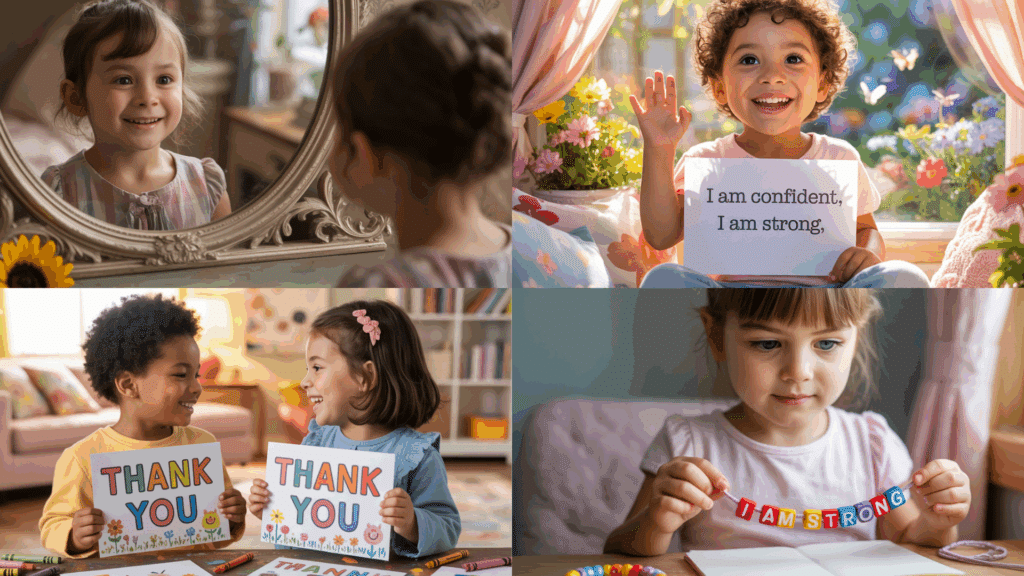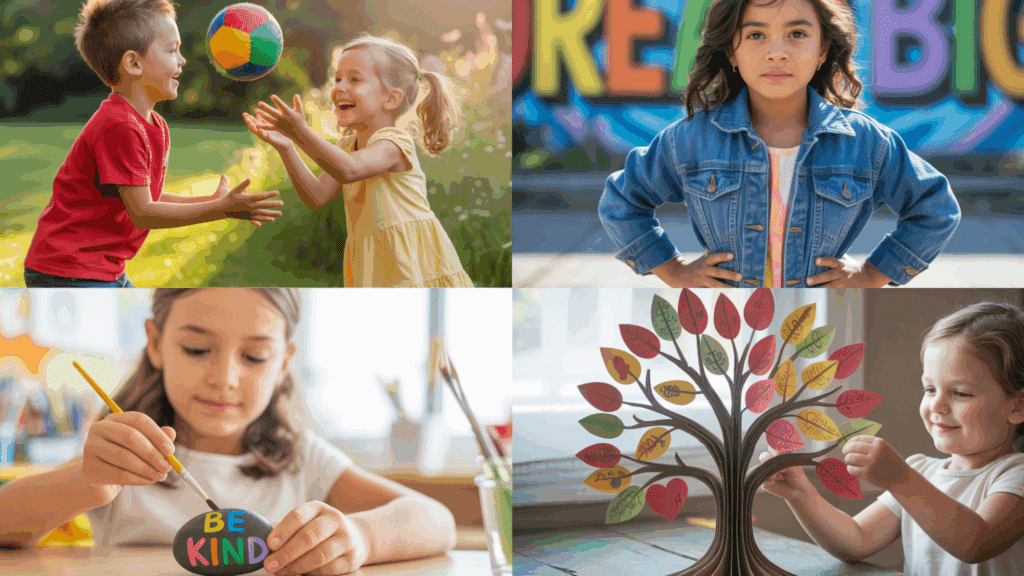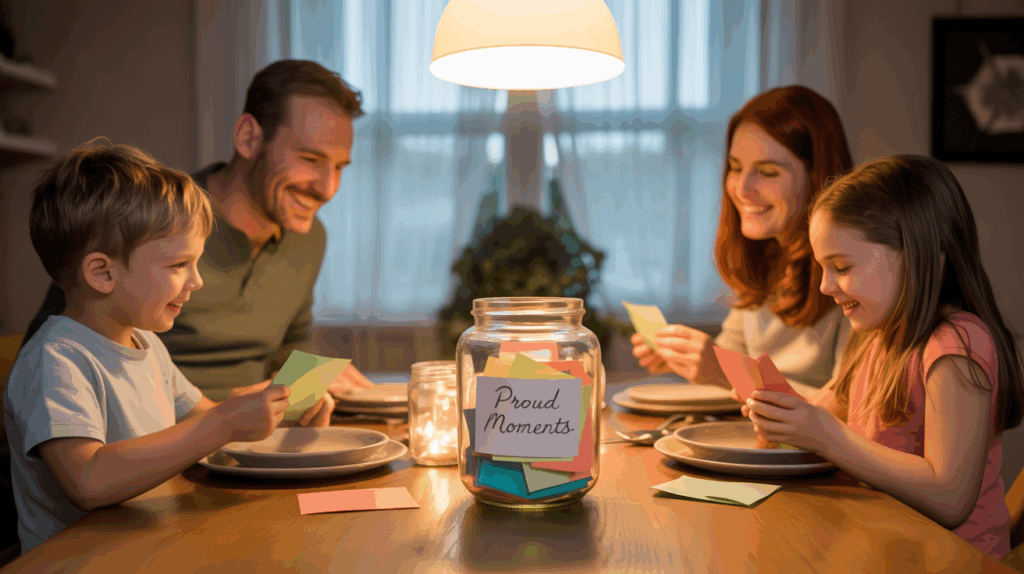Do you notice your child saying things like “I can’t do this” or “I’m not good enough”? These words hurt more than just feelings. They shape how kids see themselves.
Most parents don’t know that inner voices start forming as early as age 3. What children tell themselves today builds their self-image for years to come.
This guide shows you tested methods to help your little ones build mental strength. They’ll learn to face problems with confidence instead of fear.
Keep reading to find out how these simple activities can help your child grow into a confident, happy person!
Practicing Positive Self-Talk: Importance and Benefits
The words kids say to themselves matter. Positive self-talk activities help children build mental shields against doubts and fears.
When children learn to speak kindly to themselves, they grow in many ways:
- They feel better about who they are.
- They try new things without fear of failing.
- They bounce back faster from small setbacks.
- They handle tough times with more courage.
- They build true belief in their skills.
Studies show that kids who use good self-talk score higher on tests. They also make friends more easily. This mental skill works like a muscle – the more they use it, the stronger it gets.
Incorporating Positive Self-Talk Into Kids: A How-To

Getting kids to talk well to themselves takes time, but with these simple steps, you can make it part of their daily habits:
1. Start with clear examples
Show kids what positive self-talk sounds like by using it yourself. Say things like “I can figure this out” or “I’m going to keep trying” when you face small problems at home. Children copy what they see, so be the model they can follow.
2. Turn mistakes into chances to learn
When your child makes a mistake, help them find the lesson. Instead of “I failed,” teach them to say “I’m learning.” This small change helps kids see that trying counts more than getting things perfect the first time.
3. Create fun word lists together
Make a list of strong phrases kids can use when things get tough. Phrases like “I can do hard things” or “I’ll try a different way” give kids tools they can pull out when they need them most. Put these lists where kids can see them daily.
4. Notice and praise good self-talk
When you hear your child saying something good about themselves, point it out. Tell them how proud you are that they’re using helpful words. This makes the behavior more likely to continue and grow stronger over time.
5. Turn negative talk into questions
Teach kids to question bad thoughts. If they say, “I’m bad at math,” ask them, “Is that really true all the time?” or “What’s one math problem you solved well?” These questions help break the cycle of negative thinking.
Positive self-talk activities work best when they’re part of everyday life, not just when problems come up. With time and practice, your child will start to use these skills without your reminders.
Fun and Easy Positive Self-Talk Activities for Children

These positive self-talk activities take just minutes but build mental skills that last for years. They’re made to fit easily into your busy family schedule while making a big difference in how kids see themselves:
1. Mirror Affirmation Game
This activity encourages kids to stand in front of a mirror and say positive affirmations out loud.
It helps build self-confidence by reinforcing positive self-beliefs. Kids can take turns looking at themselves and saying, “I am strong,” “I am kind,” and other empowering phrases.
- Items needed: Mirror, affirmation cards (optional)
- Instructions: Stand in front of a mirror and say positive affirmations aloud. Encourage kids to smile and repeat affirmations daily.
2. Compliment Chain
Kids create a compliment chain where they give and receive compliments from peers. Each compliment starts with something positive about the person’s actions or character, reinforcing their strengths.
This activity fosters kindness and builds self-esteem, making positive self-talk a communal experience.
- Items needed: None
- Instructions: Start by giving a compliment to a peer, who then gives a compliment to the next person. Keep the chain going.
3. Positivity Jars
Create a positivity jar where kids write down positive thoughts or accomplishments on slips of paper.
Whenever they feel down, they can pick a paper from the jar to remind themselves of their worth. It’s a great tool for maintaining a positive mindset during tough times.
- Items needed: Jar, paper, pens
- Instructions: Write down positive things on slips of paper and put them in the jar. Read one when feeling down.
4. “I Can” Post-it Notes
This activity helps kids set daily intentions and build self-confidence by writing down things they can do on post-it notes. Each day, they add a new note to their collection, reinforcing the power of positive self-talk and actions.
- Items needed: Post-it notes, markers
- Instructions: Have kids write down an “I can” statement on a post-it note. Stick it somewhere visible and add a new one each day.
5. Power Word Hunt
In this game, kids hunt for words that represent positive traits and characteristics, such as “brave,” “kind,” or “helpful.” The goal is to find as many power words as possible, which they can use in their self-talk.
- Items needed: Word cards, paper
- Instructions: Search for power words written on cards. Each time a word is found, the child says it out loud and explains why it’s important.
6. Thank You Card Exchange
This activity allows children to write thank-you cards to themselves for their efforts or achievements. It reinforces positive self-reflection and gratitude, while encouraging kids to acknowledge their own successes.
- Items needed: Card stock, markers
- Instructions: Write thank-you cards to yourself for something you did well today. Exchange them with others to read.
7. “I Am” Power Statements
Kids practice saying “I am” statements like “I am a good friend” or “I am a great listener.” This reinforces their self-worth and builds positive self-talk, which they can use in everyday life.
- Items needed: None
- Instructions: Have kids repeat empowering “I am” statements aloud. Encourage them to believe and internalize the statements.
8. Positive Self-Talk Bingo
This fun activity combines positive affirmations with a game of bingo. Kids mark off a bingo card every time they practice positive self-talk during the day. The game encourages them to use affirmations frequently.
- Items needed: Bingo cards, markers
- Instructions: Give kids a bingo card filled with positive affirmations. Each time they say one, they mark the card.
9. Goal Setting with Positive Self-Talk
In this activity, kids set achievable goals and use positive affirmations to encourage themselves along the way. It helps them see the link between self-talk and achieving success.
- Items needed: Paper, pens
- Instructions: Write down one goal and an affirmation for achieving it. Use the affirmation daily as you work toward the goal.
10. Positive Picture Collage
Kids create a collage of pictures that represent positive qualities like kindness, bravery, and confidence. By reflecting on the pictures, they build a mindset of strength and positivity.
- Items needed: Magazines, scissors, glue, paper
- Instructions: Cut out pictures that represent positive traits. Glue them to a sheet of paper to create your own positivity collage.
11. “How I Helped Today” Journal
This activity encourages kids to reflect on how they helped others each day. It builds self-awareness and reinforces the positive feeling of doing good deeds, boosting their self-esteem.
- Items needed: Journal, pen
- Instructions: Write down one way you helped someone today. Reflect on how it made you feel and why it matters.
12. Compliment Mirror Activity
Kids stand in front of a mirror and compliment themselves out loud. The goal is to encourage positive self-talk and help them appreciate their strengths. This is an empowering activity that builds confidence.
- Items needed: Mirror
- Instructions: Look in the mirror and say something nice about yourself. Repeat this each day.
13. Success Story Time
Kids share stories of their own successes, big or small, with the group. This activity allows them to practice talking positively about themselves, helping to build a habit of self-encouragement.
- Items needed: None
- Instructions: Share a personal success story with the group. Focus on the positive aspects of the experience.
14. Positivity Scavenger Hunt
Organize a scavenger hunt where kids search for items that represent positive qualities like kindness, courage, or creativity. This reinforces positive self-talk by linking actions with traits they value.
- Items needed: List of positive traits, objects representing them
- Instructions: Search for items that represent positive qualities. Discuss why each item is meaningful.
15. Gratitude Rocks
Kids write down things they’re grateful for on small rocks. The rocks serve as reminders of positive thoughts, helping to create an environment of gratitude and self-appreciation.
- Items needed: Small rocks, markers
- Instructions: Write something you’re thankful for on a rock. Keep the rock as a reminder to practice gratitude daily.
16. Positive Self-Talk Story Time
In this activity, kids listen to a story where the main character practices positive self-talk to overcome challenges. Afterward, they discuss how the character’s positive mindset helped them succeed.
- Items needed: A book with a positive message
- Instructions: Read a story with a character who uses positive self-talk. Discuss how it helped the character.
17. “I Am” Affirmation Necklace
Kids create necklaces with beads that represent positive traits. Each time they put on their necklace, they say a positive affirmation about themselves, reinforcing their self-worth.
- Items needed: Beads, string, markers
- Instructions: Make a necklace with beads that represent positive traits. Wear it and say an affirmation each day.
18. Positive Affirmation Song
Kids create their own song using positive affirmations. The music helps them internalize the words and make positive self-talk fun. This activity boosts their confidence in a creative way.
- Items needed: None
- Instructions: Create a song with positive affirmations. Sing it together, making it a fun, daily routine.
19. Thankful Tree
Kids write things they’re thankful for on leaves and hang them on a tree. The thankful tree grows each day as kids add more positive things they appreciate, reinforcing a habit of positive reflection.
- Items needed: Paper, scissors, tape, a tree branch
- Instructions: Write something you’re thankful for on a leaf. Tape it to a branch to grow your thankful tree.
20. Affirmation Mirror Decals
Decorate a mirror with positive affirmation stickers that kids can read aloud each time they look in the mirror. This makes the act of positive self-talk a fun and consistent daily practice.
- Items needed: Stickers, mirror
- Instructions: Place affirmation stickers on a mirror. Read each one aloud when you see it.
21. Affirmation Bracelet
Kids make bracelets using beads that correspond to different affirmations. Each time they put on the bracelet, they say a different affirmation aloud, helping to reinforce positive thinking.
- Items needed: Beads, string
- Instructions: Create a bracelet with affirmations written on beads. Wear it and say a different affirmation each day.
These positive self-talk activities work best when done often and with joy. When kids connect fun with good thinking, they’re more likely to use these skills when facing hard times.
Creative Activities to Foster Positive Self-Talk in Kids

Beyond the basics, these creative positive self-talk activities help children express feelings in new ways.
They mix art, play, and words to reach kids who learn in different styles:
22. The Compliment Wall
Create a wall where kids post compliments about themselves or others. This positive reinforcement helps boost self-esteem by focusing on strengths and achievements.
- Items needed: Wall space, paper, pens
- Instructions: Write a compliment about yourself or someone else. Post it on the wall to share positivity.
23. Positive Self-Talk Coloring Sheets
Use coloring sheets that include positive messages and affirmations. As kids color, they can reflect on the positive words, reinforcing self-worth and a positive mindset.
- Items needed: Coloring sheets, crayons
- Instructions: Color in a sheet with positive messages. Reflect on the affirmations while you color.
24. Confidence Superhero Capes
Kids create superhero capes that represent their strengths and positive qualities. They wear their capes while saying affirmations, helping them feel empowered and confident.
- Items needed: Fabric or paper for capes, markers
- Instructions: Create superhero capes and write affirmations on them. Wear the cape and repeat the affirmations.
25. Positive Word Hopscotch
Create a hopscotch game using positive words instead of numbers. Kids hop on the words while saying them aloud, reinforcing positive self-talk during physical activity.
- Items needed: Chalk, sidewalk
- Instructions: Draw a hopscotch grid with positive words. Hop on the words and say them aloud.
26. Compliment Ball Toss
In this fun game, kids toss a ball to each other and give a compliment each time they catch it. The activity promotes kindness and positive self-talk while encouraging kids to appreciate themselves and others.
- Items needed: Softball
- Instructions: Toss the ball to a friend. Each time you catch it, give a compliment.
27. “I Believe in Me” Song Dance Party
Kids dance to a song that includes the phrase “I believe in me,” repeating it throughout. This activity uses music and movement to reinforce the power of positive self-talk.
- Items needed: Music player
- Instructions: Play a song that includes “I believe in me.” Dance and sing along, repeating the phrase.
28. Positive Postcard Exchange
Kids write positive messages on postcards for each other, reinforcing their self-worth through kind words. The exchange creates a supportive atmosphere and helps kids internalize compliments.
- Items needed: Postcards, pens
- Instructions: Write a positive message on a postcard for a friend. Exchange postcards and read them aloud.
29. “I Am” Cloud Prints
Kids create cloud shapes on paper and write an “I am” affirmation inside each cloud. This visual activity helps reinforce self-belief through fun, hands-on art.
- Items needed: Paper, cotton balls, glue, markers
- Instructions: Create clouds on paper using cotton balls. Write positive “I am” affirmations inside each cloud.
30. Praise Parade
Children take turns walking around the room while others give them positive praise and affirmations. This parade builds self-confidence and encourages them to appreciate their strengths.
- Items needed: None
- Instructions: Walk around while others give you positive praise. Take turns being in the spotlight.
31. Power Pose Challenge
Teach kids power poses that help boost confidence, like standing tall with arms on hips. After striking their power pose, they say a positive affirmation aloud.
- Items needed: None
- Instructions: Stand in a power pose. Hold it for 30 seconds, then say an affirmation aloud.
32. Strengths Wheel
Create a wheel with different strengths written on it. Kids take turns spinning the wheel and saying an affirmation related to the strength they land on.
- Items needed: Paper, scissors, markers, pencil
- Instructions: Draw a wheel with strengths written on it. Spin and say an affirmation based on the strength you land on.
33. Positive Self-Talk Flashcards
Create flashcards with positive statements or affirmations on one side. Kids draw a card and repeat the affirmation aloud to build their confidence and positive self-talk.
- Items needed: Cards, markers
- Instructions: Draw a flashcard with a positive affirmation. Say the affirmation out loud.
34. Kindness Tree
Kids add leaves to a tree each time they practice kindness or positive self-talk. The tree grows as they develop a habit of recognizing their strengths and helping others.
- Items needed: Paper, markers, scissors, tree drawing
- Instructions: Draw a tree and add a leaf each time you do something kind or say something positive.
35. Superpower Journals
Kids create journals where they record their daily achievements and what makes them feel strong. Writing about their strengths helps them build a habit of positive reflection.
- Items needed: Journal, pen
- Instructions: Write down a daily achievement and how it made you feel strong. Review it each week for inspiration.
Adding these positive self-talk activities to your family routine builds a home where good thinking grows naturally. The time you spend now plants seeds for stronger mental health as your child grows.
Promoting Positive Self-Talk in Kids: Tips for Parents

Parents have a major impact on how children talk to themselves. Here are some tested ways to help your kids build this important skill at home, in school, and during playtime:
- Watch your own self-talk when kids are around – they learn first by listening to you.
- Make a “proud moment” jar where family members write down daily wins, no matter how small.
- Create morning check-ins where kids say one thing they like about themselves before school.
- Use stuffed animals or puppets to practice positive phrases with younger children.
- Read books with characters who face challenges and use good self-talk to overcome them.
- Replace “I can’t” with “I can’t yet” to teach kids that skills grow with practice.
- Set up positive self-talk activities like mirror time, where kids say three good things about themselves.
The Bottom Line
The words kids use shape who they become. When children learn to speak kindly to themselves, they build mental tools that help them face life’s ups and downs.
Starting these habits early makes them stick better. The positive self-talk activities in this guide give your child practical ways to replace doubt with trust in themselves.
What positive self-talk activities have helped your child the most?




